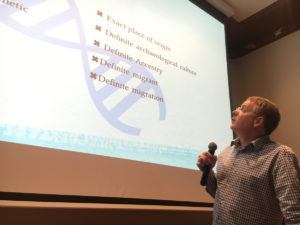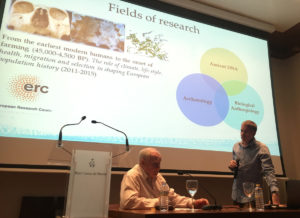Conferencia del Dr. Ron Pinhasi en Murcia
 El pasado jueves 10 de mayo a las 19:30h en el Salón de Actos del Real Casino de Murcia, el Dr. Ron Pinhasi impartió la conferencia titulada: “Human history through ancient DNA genomics” (La historia humana a través de la genómica del ADN).
El pasado jueves 10 de mayo a las 19:30h en el Salón de Actos del Real Casino de Murcia, el Dr. Ron Pinhasi impartió la conferencia titulada: “Human history through ancient DNA genomics” (La historia humana a través de la genómica del ADN).
Organizada por la Asociación Mupanquat, la charla fue traducida al Español de manera simultánea por el Dr. Michael J. Walker.
El Dr. Pinhasi es un reconocido paleogenetista de la Universidad de Viena y colaborador con las investigaciones paleoantropológicas y genéticas de los restos neandertales de la Sima de las Palomas de Torre-Pacheco y los esqueletos calcolíticos del Camino del Molino en Caravaca de la Cruz.
Breve reseña biográfica en inglés del Dr. Pinhasi:
Dr. Ron Pinhasi received his BA in Archaeology from Simon Fraser University, Vancouver Canada (1996), his MA from Katholike University Leuven, Belgium (1997) and his PhD from the University of Cambridge, UK in 2003. He spent two years (2003-2004) in a Lise Meitner postdoctoral position at the Natural History Museum, Vienna, examining the health status of early mediaeval Austrian populations.
He held a Starter ERC Starter grant (2011-2015) for an interdisciplinary project which focused on the integration of ancient DNA methods, isotope analysis, anthropology and archaeology to the study of the biology, mobility and behaviour of past human populations during the last 45,000 years. This research led to >40 publications, and the analysis of human ancient DNA of over 3000 Palaeolithic, Mesolithic and Neolithic human skeletons from across Eurasia, Africa and the Pacific.
Current Research Interests
– Human evolution, variation, demographic history and microeveoluion
– Middle-Upper Palaeolithic transition in the Caucasus
– Health in past populations and the evolution of pathogens and disease (ancient DNA studies of pathogens)
– Palaeogenetics: population history, selection, phylogeography
– Variability in human growth and development in past populations
– The origins and spread of agriculture in the Near East, Anatolia and Europe
Appointments
2003-2004 Lise Meitner postdoctoral research fellow, Natural History Museum Vienna
2004-2007 Lecturer, Roehampton University, London
2007-2012 Lecturer, Department of Archaeology, University College Cork, Ireland
2012-2017 Associate Professor at University College Dublin, Ireland
July 2017- present. Assistant Professor, Department of Evolutionary Anthropology, University of Vienna, Austria
Degrees
1996 Simon Fraser University, BC, Canada; Qualification: BA
1997 Katholike Universiteit Leuven, Belgium; Qualification: MA (Eastern Mediterranean Archaeology)
2003 University of Cambridge; Qualification: PhD (Biological Anthropology)
Awards
2010: UCC Presidential Early Career Academic Achievement Award
2017: Fabio Frassetto International Prize in Physical Anthropology, Academia Nazionale dei Lincei, Roma
Some significant recent publications
Olalde I…Krause J, Pinhasi R, Haak W, Barnes I, Lalueza-Fox C, Reich D. 2018. The Beaker phenomenon and the genomic transformation of northwest Europe. Nature 555: 190-196.
Mathieson I …Krause J., Pinhasi R., Reich D. 2018 The genomic history of southeastern Europe. Nature 555: 197-210.
Skoglund P… Pääbo S, Patterson N, Boivin N, Pinhasi R, Krause J, Reich D. 2017. Reconstructing prehistoric African population structure. Cell 171:59-71.
Jones, ER… Pinhasi, R, Bradley, DG. 2017. The Neolithic transition in the Baltic was not driven by admixture with early European farmers. Current Biology 27: 576-582.
González-Fortes G… Pinhasi R, Manica A, Hofreiter M. 2017. Paleogenomic evidence for multi-generational mixing between Neolithic farmers and Mesolithic hunter-gatherers in the Lower Danube Basin. Current Biology 27: 1801-1810.
Siska V…. Pinhasi R, Bhak J, Manica A. 2017. Genome-wide data from two early Neolithic East Asian individuals dating to 7700 years ago. Science Advances 3 (2): e1601877.
Skoglund P, Pinhasi R, Reich D. 2016. Genomic insights into the peopling of the Southwest Pacific. Nature 538:510-513.
Lazaridis J, Patterson N, Pinhasi R, Reich D. 2016. Genomic insights into the origins of farming in the ancient Near East. Nature 536:419-424.
Mathieson I, Pinhasi R, Reich D. 2015. Genome-wide patterns of selection in 230 ancient Eurasians.Nature 528: 499-503
Gallego Llorente M, Pinhasi, Manica A. 2015. Ancient Ethiopian genome reveals extensive Eurasian admixture in Eastern Africa. Science 350: 820-823.
Gamba C, Bradley DG, Pinhasi R. 2014. Genomic flux and stasis during five millennia of Hungarian prehistory.Nature Communications 5:1-9.
Pinhasi R, Fernandes D, Sirak K, Novak M, Connell S, et al. 2015. Optimal ancient DNA yields from the inner ear part of the human petrous bone. PLoS ONE 10(6): e0129102.
Pinhasi R., Fort J., Ammerman A.J. 2005. Tracing the origin and spread of agriculture in Europe. PLoS Biology 3 (12): e410.
Pinhasi R, Higham, TFG, Golovanova LV, Doronichev VB. 2011. Revised age of late Neanderthal occupation and the end of the Middle Palaeolithic in the northern Caucasus. Proceedings of the National Academy of Sciences USA 108: 8611-8616.
Editorial Board Member
PLoS One (2014- present)
Previous Research Projects
Sponsor: University College Dublin (UCD); Title: Charting early modern human survival, competition and adaptation in the Caucasus and Eastern Europe in the face of climatic oscillations and unfavourable environments; 01-MAY-13 / 31-OCT-14
Sponsor: EC Framework (FP7); Title: From the earliest modern humans to the onset of farming (45,000-4,500 BP): the role of climate, life-style, health, migration and selection in shaping European population history (ADNABIOARC); Start 01-OCT-12 / 31-DEC-15
Sponsor: University College Dublin (UCD); Title: Equipment & light lab construction work for a new Human aDNA laboratory; 07-MAY-13 / 06-MAY-14
Sponsor: Irish Research Council (IRC); Title: Analyses of the quality of life in Europe during the Early Middle Ages (AD 500-1100) – Comparisons between human skeletal series from Ireland and Croatia based on bioarchaeological, ancient DNA and stable isotope data; 01-OCT-13 / 30-SEP-15
Sponsor: Irish Research Council (IRC); Title: Population variation following the Neolithic revolution: assessing the palaeogenetics of southern Europeans throughout the Neolithic; 01-OCT-13 / 30-SEP-17





